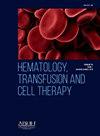IMPROVEMENTS IN FATIGUE AND 6-MINUTE WALK TEST IN ADULTS WITH ALPHA- OR BETA-NON–TRANSFUSION-DEPENDENT THALASSEMIA: THE PHASE 3 ENERGIZE TRIAL OF MITAPIVAT
IF 1.8
Q3 HEMATOLOGY
引用次数: 0
Abstract
Background
Thalassemia, a group of inherited disorders characterized by ineffective erythropoiesis and chronic hemolytic anemia, is associated with wide-ranging impacts on health-related quality of life (HRQoL), such as impaired physical functioning and fatigue. Anemia has been associated with increased symptom burden and poor HRQoL in patients (pts) with non–transfusion-dependent thalassemia (NTDT). There are no available oral disease-modifying therapies that have been shown to improve HRQoL in β-thalassemia and no agents are approved for α-thalassemia. In a phase 2 study of pts with NTDT, improvements in hemoglobin were observed with mitapivat, a first-in-class, oral, allosteric activator of pyruvate kinase, and it has the potential to improve HRQoL.
Aims
To evaluate the impact of mitapivat vs placebo on fatigue, physical function, and other thalassemia symptoms in adults with α- or β-NTDT in ENERGIZE, a phase 3, double-blind, randomized, placebo-controlled, global trial.
Methods
Adults (≥18 years) were randomized 2:1 to mitapivat 100 mg twice daily or placebo for 24 weeks (wks). NTDT was defined as ≤5 red blood cell (RBC) units transfused in the 24 wks before randomization and no RBC transfusions ≤8 wks before informed consent or during screening. The Functional Assessment of Chronic Illness Therapy–Fatigue Scale (FACIT-Fatigue), 6-Minute Walk Test (6MWT), and Patient Global Impression of Change (PGIC) of Fatigue, Thalassemia Symptoms, and Walking Capacity were among the outcomes assessed. Changes from baseline (BL) for FACIT-Fatigue (Wks 12–24) and 6MWT (Wk 24), and the results of PGIC-Fatigue, (Wks 12–24), PGIC-Thalassemia Symptoms, and PGIC-Walking Capacity (both Wk 24) were summarized. The clinically meaningful within-person change (MWPC) threshold for FACIT-Fatigue was estimated to be a ≥4.5-point change from BL in average score from Wks 12–24, using an anchor-based method.
Results
194 pts were randomized (mitapivat n = 130; placebo n = 64); BL characteristics were similar between treatment arms. Mitapivat demonstrated a statistically significant improvement compared with placebo in change from BL to Wk 12–24 average FACIT-Fatigue score; least-squares mean (LSM) change from BL was 4.85 for mitapivat vs 1.46 for placebo (LSM difference (95% CI): 3.40 (1.21, 5.59); 2-sided p < 0.0026), and 36.2% of pts in the mitapivat arm achieved the MWPC threshold of ≥4.5 vs 21.9% in the placebo arm. For the 6MWT, LSM change from BL to Wk 24 was 30.48 m for mitapivat and 7.11 m for placebo (LSM difference (95% CI): 23.36 m (6.90, 39.83)). The observed frequency of pts with improvements (reporting feeling much/a little better) in PGIC-Fatigue was higher for pts in the mitapivat arm than the placebo arm at Wk 12 (63.1% vs 23.4%), Wk 16 (69.2% vs 23.4%), Wk 20 (62.3% vs 28.1%), and Wk 24 (60.8% vs 31.3%). Improvements in PGIC-Thalassemia Symptoms and PGIC-Walking Capacity were also reported in a higher frequency of pts in the mitapivat arm than in the placebo arm at Wk 24 (67.7% vs 32.8%; 55.4% vs 28.1%, respectively).
Summary/Conclusion
Mitapivat is the first oral, disease-modifying, investigational therapy with which meaningful improvements in aspects of HRQoL, including fatigue and walking capacity, were observed in a clinical trial that enrolled both pts with α-NTDT and pts with β-NTDT.
改善α-或β-非输血依赖型地中海贫血成人的疲劳和6分钟步行测试:米他匹伐第3期活力试验
背景地中海贫血是一组遗传性疾病,其特征是红细胞生成障碍和慢性溶血性贫血,对健康相关的生活质量(HRQoL)有广泛的影响,如身体功能受损和疲劳。贫血与非输血依赖型地中海贫血(NTDT)患者(pts)症状负担加重和 HRQoL 低下有关。目前还没有口服改变疾病疗法可改善β地中海贫血患者的 HRQoL,也没有药物获准用于α地中海贫血。在一项针对 NTDT 患者的 2 期研究中,观察到米他匹伐(一种首创的丙酮酸激酶异位激活剂口服药物)可改善血红蛋白,并有可能改善 HRQoL。目的在ENERGIZE(一项3期、双盲、随机、安慰剂对照的全球性试验)中评估米他匹伐与安慰剂相比对α-或β-NTDT成人患者的疲劳、身体功能和其他地中海贫血症状的影响。方法将成人(≥18岁)按2:1的比例随机分配到米他匹伐100毫克或安慰剂中,每天两次,为期24周(周)。NTDT的定义是:随机化前24周内输注的红细胞(RBC)单位少于5个,且在知情同意前或筛查期间输注RBC的时间少于8周。评估的结果包括慢性疾病治疗功能评估-疲劳量表(FACIT-Fatigue)、6 分钟步行测试(6MWT)以及疲劳、地中海贫血症状和步行能力的患者总体变化印象(PGIC)。总结了 FACIT-疲劳(第 12-24 周)和 6MWT(第 24 周)与基线(BL)相比的变化,以及 PGIC-疲劳(第 12-24 周)、PGIC-地中海贫血症状和 PGIC-行走能力(均为第 24 周)的结果。采用基于锚的方法估算,FACIT-疲劳的有临床意义的人内变化(MWPC)阈值为第12-24周平均得分与BL相比变化≥4.5分。与安慰剂相比,米他匹伐对第12-24周FACIT-Fatigue平均得分的变化有显著的统计学改善;米他匹伐的最小二乘平均值(LSM)为4.85,安慰剂为1.46(LSM差异(95% CI):3.40 (1.21, 5.59);双侧p< 0.0026),米他匹伐治疗组36.2%的患者达到了MWPC≥4.5的阈值,安慰剂治疗组为21.9%。就 6MWT 而言,从基础阶段到第 24 周,mitapivat 的 LSM 变化为 30.48 米,安慰剂为 7.11 米(LSM 差异 (95% CI):23.36 米 (6.90, 39.83))。在第12周(63.1% vs 23.4%)、第16周(69.2% vs 23.4%)、第20周(62.3% vs 28.1%)和第24周(60.8% vs 31.3%)时,观察到PGIC-疲劳有所改善(报告感觉好很多/好一点)的受试者频率,米他匹伐治疗组高于安慰剂治疗组。在第24周时,米他匹伐治疗组患者的PGIC-地中海贫血症状和PGIC-行走能力得到改善的比例也高于安慰剂治疗组(分别为67.7% vs 32.8%;55.4% vs 28.1%)。摘要/结论米他匹伐特是第一种口服、改变病情的试验性疗法,在同时纳入α-NTDT患者和β-NTDT患者的临床试验中,观察到患者的HRQoL(包括疲劳和行走能力)得到了显著改善。
本文章由计算机程序翻译,如有差异,请以英文原文为准。
求助全文
约1分钟内获得全文
求助全文
来源期刊

Hematology, Transfusion and Cell Therapy
Multiple-
CiteScore
2.40
自引率
4.80%
发文量
1419
审稿时长
30 weeks
 求助内容:
求助内容: 应助结果提醒方式:
应助结果提醒方式:


